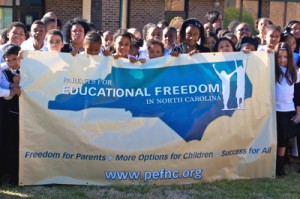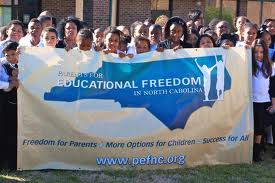 An attempt to bring a tax credit scholarship to low-income children in North Carolina succumbed to a short session and broader tax and education politics as the General Assembly adjourned on Tuesday. But the effort is worth noting in part because of the group pushing it.
An attempt to bring a tax credit scholarship to low-income children in North Carolina succumbed to a short session and broader tax and education politics as the General Assembly adjourned on Tuesday. But the effort is worth noting in part because of the group pushing it.
Parents for Educational Freedom in North Carolina is a diverse, progressive organization with a membership of 60,000 and is led by a home-grown talent, Darrell Allison, who has a legal and civic mind and has worked in the White House and the U.S. Department of Justice. Allison and his team bring both a zeal to help struggling low-income children and a concern for getting the policy right and making the program accountable. (Disclosure to readers: I worked with PEFNC in preparations for the bill.)
The bill that ultimately was filed, HB 1104, fell short of the type of academic testing requirements the group was seeking. But overall the language kept faith with the 1,200 people who rallied at the Capitol in May, the 4,000 calls and emails that urged lawmakers to act, and the Democrats who signed on as co-sponsors. Importantly, at a time when some tax credit scholarship programs are coming under scrutiny for laws that lack genuine accountability and transparency, Allison and his team were trying to make sure their program had plenty of both.
The “Equal Opportunity Scholarship” was to be funded by contributions from companies that in turn received a dollar-for-dollar tax credit, and the scholarships were to be restricted to students with genuine economic disadvantage – those with household incomes not exceeding 225 percent of poverty. Scholarship organizations could not be tied to any school and could not allow donors to designate that their money go toward any particular student or school. The scholarship itself was to be $4,000, or just under half the amount the state and local governments spend on each public school student. Early fiscal evaluations showed that some versions of the bill saved money even when factoring only the state portion. (more…)
 New Hampshire: The state legislature overrides Gov. John Lynch's veto of a tax credit scholarship bill. (Manchester Union-Leader)
New Hampshire: The state legislature overrides Gov. John Lynch's veto of a tax credit scholarship bill. (Manchester Union-Leader)
North Carolina: School choice leaders throw in the towel on a legislative proposal for tax credit scholarships. (Associated Press) A judge rules that a virtual charter school cannot open, siding with the state board of education, which had refused to consider the proposed school's application. (Raleigh News & Observer)
New Jersey: Gov. Chris Christie says it's unlikely that a school voucher bill will move in the state legislature this year. (NJ Spotlight)
Florida: Faced with declining enrollment and increased competition from school choice, the Broward County School Board wants to open its own charter schools. (South Florida Sun Sentinel) Meanwhile, the state Charter School Appeal Commission sides with four of five charter school applications rejected by the Palm Beach County School Board. (Palm Beach Post)
Pennsylvania: A well-funded political action committee and the Philadelphia Archdiocese are pushing hard to expand the state's tax credit scholarship program. (Philadelphia Inquirer)
Texas: The state's main charter school group filed suit against the state, charging it with short-changing charters on facilities funding and arbitrarily capping the number of charters that can open. (Houston Chronicle) (more…)
Editor's note: Due to technical difficulties with the blog, many redefinED readers were unable to read this post when it was originally published Friday. Thanks to those of you who notified us. Thanks to all for your patience.
 It’s old news that many religious schools teach creationism and intelligent design – and that some of those schools accept students with vouchers and tax credit scholarships. But the recent New York Times piece on tax credit scholarships gave school choice critics fresh excuse to pick up and hurl. Teachers union president Randi Weingarten immediately tweeted, “Public money being funneled to creationist, anti-science religious schools.” A few days later, a left-of-center think tank in North Carolina, out to stop a legislative proposal for tax credit scholarships in that state, described the Times story as concluding that “redirected public money” is being used to “spread fundamentalist religious theology like creationism.”
It’s old news that many religious schools teach creationism and intelligent design – and that some of those schools accept students with vouchers and tax credit scholarships. But the recent New York Times piece on tax credit scholarships gave school choice critics fresh excuse to pick up and hurl. Teachers union president Randi Weingarten immediately tweeted, “Public money being funneled to creationist, anti-science religious schools.” A few days later, a left-of-center think tank in North Carolina, out to stop a legislative proposal for tax credit scholarships in that state, described the Times story as concluding that “redirected public money” is being used to “spread fundamentalist religious theology like creationism.”
I’m in the science tribe. The evolution-is-fact tribe. But I don’t share their outrage. During my own evolution on school choice, I’ve had to grapple with the fact that many private schools are at odds with what the vast majority of scientists consider good science.
I’ve come to this conclusion: Even if we disagree about creationism, we shouldn’t be so blinded that we forget all the other lessons these children receive in all the other classes they take, in all the years they attend school. We should not overlook whether these children are learning to read and write and succeed in life. I'm hoping that people who do value scientific literacy would be more likely to look at the issue with a sober analytical eye. I’m hoping they might even be willing to place scientific learning in a broader societal context, where many public school students are suffering in part because they lack the foundational learning skills that also handicap them in the arena of science.
The fact is, not many traditional public school students are doing well right now in science. It pains me to say this, because I had amazing biology, chemistry and physics teachers in my public high school. What I learned from them has benefited me personally and professionally. But the facts are informative. In 2009, 21 percent of high school seniors scored at proficient or above on the National Assessment of Educational Progress in science. Break those numbers down into subgroups, and depressing morphs into apocalyptic. Only 8 percent of low-income and Hispanic students reached that bar. Only 4 percent of black students did.
In Florida, the state I know best, only 27 percent of low-income students scored at grade level or above on the state’s high school science test in 2011. To be fair, that’s up from 19 percent in 2006 – and many talented people worked hard to move the needle even that much. But it’s nowhere near high enough or fast enough. (more…)
 North Carolina: The legislative push is on to start a statewide tax credit scholarship program. (Associated Press)
North Carolina: The legislative push is on to start a statewide tax credit scholarship program. (Associated Press)
Florida: A former state board of education chair defends the state's decision to offer free tutoring services to low-income families. (Miami Herald)
California: Expanded school choice is at the heart of an increasingly tense feud within the Democratic Party between the teachers unions and supporters of education reform. (Reuters)
Washington: Charter school supporters hope the fourth time is the charm in finally bringing charters to one of the last states left without any. (Seattle Times) (more…)
 North Carolina lawmakers took parental choice to new heights last year by removing a cap on charter schools and creating a tax credit scholarship program for students with disabilities. But all signs indicate they’re not done yet - and that a tax credit scholarship for low income students may be next on the agenda.
North Carolina lawmakers took parental choice to new heights last year by removing a cap on charter schools and creating a tax credit scholarship program for students with disabilities. But all signs indicate they’re not done yet - and that a tax credit scholarship for low income students may be next on the agenda.
A dozen North Carolina lawmakers visited Florida on a fact-finding trip last week. They heard from former Gov. Jeb Bush and John Kirtley, chairman of Step Up for Students, which administers Florida’s tax credit program for low-income students. They met Florida lawmakers and corporate leaders who support it. And they visited the Miami Union Academy, a participating private school with nearly 300 students.
“Let’s be honest: When you talk about a state in our nation that has a lot of sunshine, a lot of innovation and a new frontier in ed reform, it’s the state of Florida,” said Darrell Allison, president of Parents for Educational Freedom in North Carolina.
Allison, who also made the trip, along with some North Carolina business leaders, said strong, bipartisan support for last year’s choice legislation in NC is a hopeful sign that the adversarial tone that characterized so many past debates about choice is beginning to lose its edge. For North Carolina families, he said, that’ll be a good thing.
“Around the kitchen table, that discussion is different than at the policy table, right?” he said. “Mom and Dad are not really thinking about Republicans and Democrats and philosophy. They’re just trying to make sure that Johnny has the best school option that they could possibly have.”